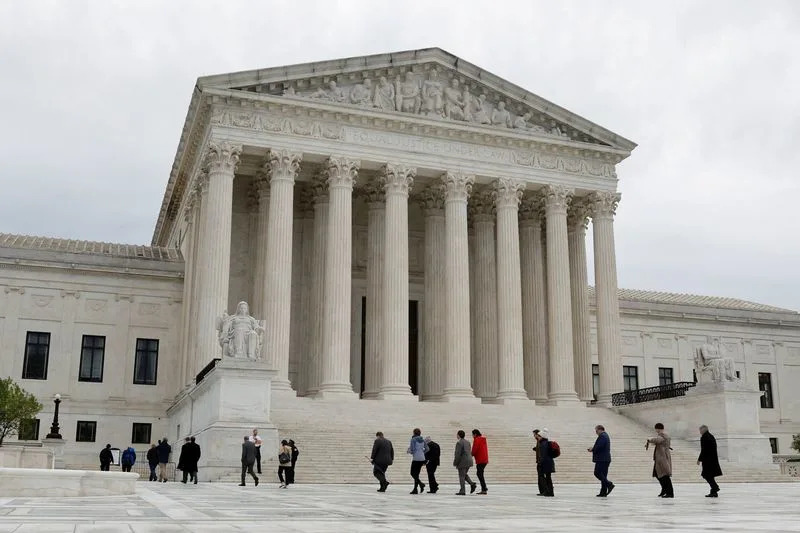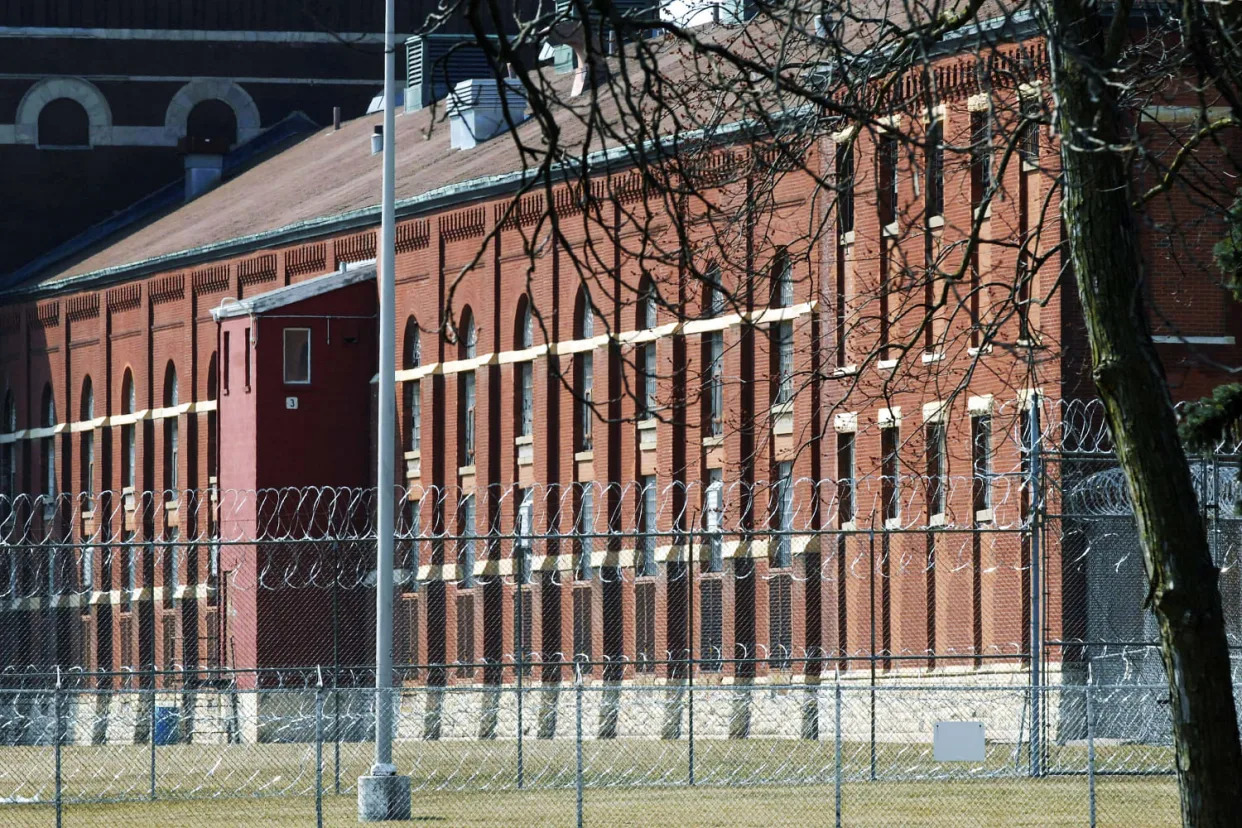John Kruzel and Andrew Chung
Mon, November 13, 2023

WASHINGTON (Reuters) - The U.S. Supreme Court's three liberal justices on Monday sharply objected to the court's refusal to hear an appeal by a former Illinois inmate who was kept in solitary confinement in a state prison and virtually deprived of any exercise for about three years.
The court takes up appeals when at least four of its nine justices agree to hear a case. None of the six conservative justices joined with the liberal justices to provide the fourth vote needed to hear former inmate Michael Johnson's appeal of a lower court's ruling rejecting his 2016 civil rights lawsuit accusing prison officials of violating the U.S. Constitution's Eighth Amendment bar on cruel and unusual punishment.
Johnson was incarcerated after being convicted of home invasion and subsequently was convicted while in prison of two instances of aggravated battery against a peace officer.
Justice Ketanji Brown Jackson, in an eight-page dissent joined by fellow liberals Sonia Sotomayor and Elena Kagan, said the lower court applied the wrong legal test to determine whether Johnson's treatment violated the Eighth Amendment.
Jackson described Johnson's solitary confinement as "unusually severe," noting that "prison officials completely deprived Johnson of exercise for nearly all of his incarceration" at Pontiac Correctional Center.
"The cramped confines of Johnson's cell prevented him from exercising there," Jackson wrote. "Thus, for three years, Johnson had no opportunity at all to stretch his limbs or breathe fresh air."
Illinois Democratic Attorney General Kwame Raoul had urged the justices to reject the appeal.
Johnson, 42, is currently released on parole, according to his lawyer Daniel Greenfield. Johnson has a history of mental illness, including depression and bipolar disorder, and suicide attempts, according to his lawyers.
During his roughly 3-1/2 years at the Pontiac facility, Johnson was found to have committed 46 violations of prison rules arising from 30 incidents, with 16 of those incidents resulting in "yard restrictions," limiting an inmate to one hour of outdoor yard access per month, Illinois officials said in court papers.
He has claimed that on multiple occasions he was denied his monthly one hour of yard access, and that from June 2015 to June 2016 he was not permitted a single hour of exercise.
The deprivation compromised his physical and mental health, according to his lawsuit.
"His muscles withered, he repeatedly smeared feces on his body, endured hallucinations and compulsively picked at his own flesh, and he required 'suicide watch' time and again," his lawyers said in court papers.
Johnson sought monetary damages, medical treatment and other relief in the lawsuit accusing prison officials of violating the Eighth Amendment by denying him exercise for a prolonged period. A federal judge rejected his claims, finding that Johnson "cannot show that he suffered adverse health consequences as a result of the denial of access to the yard."
The Chicago-based 7th U.S. Circuit Court of Appeals upheld the judge's decision in 2022, concluding that yard privilege denials as punishment for prisoner misconduct are legal unless meted out for "some utterly trivial infraction" of prison rules. Despite the lengthy deprivation, Johnson's infractions, "including spitting on inmates or guards and throwing urine and feces," were serious, the 7th Circuit concluded.
Jackson faulted the 7th Circuit's analysis, saying that instead of assessing the triviality of Johnson's prison infractions, it should have applied the Supreme Court's test assessing whether prison officials have acted with "deliberate indifference" toward an inmate's health or safety.
There was "more than enough evidence to support a reasonable jury finding that the overall three-year deprivation of yard time that Johnson was subjected to was the result of unconstitutional deliberate indifference," Jackson wrote.
Johnson's lawyer commended the liberal justices for recognizing the 7th Circuit's "indisputable legal error," but expressed regret that "imposing such cruelty - let alone on a person known to suffer from mental illness - is acceptable to any federal judge."
(Reporting by John Kruzel in Washington and Andrew Chung in New York; Editing by Will Dunham)
Liberal justices object as Supreme Court rejects prisoner's exercise claim
Lawrence Hurley
Mon, November 13, 2023

WASHINGTON — The Supreme Court on Monday refused to weigh under what circumstances prisoners in solitary confinement have a constitutional right to exercise, turning away an Illinois inmate's claim that he was denied the opportunity for three years.
The court's three liberal justices disagreed with the decision not to take up the case, with Justice Ketanji Brown Jackson writing a lengthy dissenting opinion in which she called the inmate's treatment "unusually severe." The court has a 6-3 conservative majority.
Michael Johnson, who initially represented himself in legal proceedings, was barred from the normal one hour of exercise in an outdoor yard, typically available five days a week, between 2013 and 2016, his lawyers said in court papers.
Under prison rules, exercise privileges can be withdrawn temporarily for violations. Johnson, who has mental health issues, was cited more than 70 times between 2008 and August 2016 for his conduct.
Johnson, 42, claims that the refusal to allow him to exercise as a result of his repeatedly disobeying prison rules violated his right not to be inflicted with cruel and unusual punishment under the Constitution's 8th Amendment.
He appealed to the Supreme Court after the Chicago-based 7th U.S. Circuit Court of Appeals ruled in favor of the state in March 2022 and subsequently declined to reconsider the case, with the judges split 5-5.
In an opinion joined by Justices Sonia Sotomayor and Elena Kagan, Jackson said Johnson should have been allowed to pursue his claim that officials were deliberately indifferent to his health needs.
"The consequences of such a prolonged period of exercise deprivation were predictable severe. Most notably, Johnson's mental state deteriorated rapidly," Jackson wrote.
Lower courts, she added, failed to "consider the impact of cumulative exercise deprivation on Johnson's physical and mental health, or what was known to prison officials about the risks of such deprivation."
Daniel Greenfield, one of Johnson's lawyers, said that while he was grateful for Jackson's opinion, "we are saddened to live in an era where imposing such cruelty — let alone on a person known to suffer from mental illness — is acceptable to any federal judge."
The actions of prison officials served to exacerbate Johnson's mental health issues, his lawyers said in court papers.
"His muscles withered, he repeatedly smeared feces on his body, endured hallucinations, and compulsively picked at his own flesh, and he required 'suicide watch' time and again," they wrote.
Illinois Solicitor General Jane Notz, representing the state, said in a court filing that the appeals court ruling followed precedent, saying that yard restrictions do not violate the Constitution as long as they are supported by valid prison management policies.
Johnson has been diagnosed with bipolar disorder and severe depression. He was eventually moved to a mental health unit in 2016.
After serving his sentence, Johnson was released in 2019, but after being convicted of battery he was until last month serving a new sentence in a facility that provides psychiatric care.
No comments:
Post a Comment